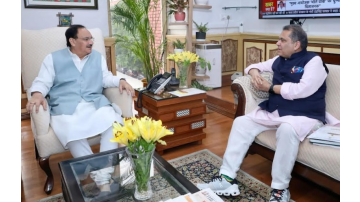
Union Minister of Health and Family Welfare JP Nadda has responded to MP Sanjeev Arora’s letter regarding inclusion of Primary Healthcare Cost Coverage under Ayushman Bharat Insurance Scheme.
Nadda mentioned in his communication that he has examined the matter and would like to inform Arora that Ayushman Bharat Pradhan Mantri Jan Arogya Yojana (AB-PMJAY) aims to provide health cover of Rs.5 lakhs per family per year for secondary and tertiary care hospitalization to approximately 12.37 Crore families which constitute bottom 40% of the country's population. Recently, Government of India expanded AB-PMJAY to provide free treatment benefits of up to 5 lakh per year on a family basis to all senior citizens aged 70 years and above, irrespective of their socio- economic status.
Adding, Nadda further mentioned in his letter that currently, AB-PMJAY provides only in-patient (IPD) treatment corresponding to a total of 1961 procedures under secondary and tertiary care which also include several day care procedures. Further, it may be noted that under National Health Mission more than 1.75 Lakhs Ayushman Arogya Mandirs (previously known as Health and Wellness Centres), have been established till 30.11.2024, to deliver healthcare services to address the primary healthcare needs of the entire population in their areas which include OPD consultations as well.
Giving this information here today, Arora said he, on September 20 last year, had written to Nadda urging him to include Primary Healthcare Cost Coverage under Ayushman Bharat Insurance Scheme. He had written to the Minister that the health and well-being of many citizens is getting affected due to the exclusion of outpatient department (OPD) services from the Ayushman Bharat Insurance Scheme.
Arora had further written to the Minister that current data from the National Health Systems Resource Centre indicates that approximately 70% of health consultations in India occur in outpatient settings. OPD services are vital for timely diagnosis and treatment; however, many families face significant financial barriers to accessing these services. Also investing in primary healthcare can yield economic returns of approximately $4 for every $1 spent, as reported by the World Bank. Furthermore, it not only makes healthcare services more accessible but can also prevent the escalation of health issues that require more costly interventions later.
Arora had mentioned in his communication that the National Sample Survey (2017) reveals that nearly 60% of households experience financial hardship due to healthcare costs, with a large portion stemming from outpatient expenses. The average OPD visit costs between 300 and 1,500, making it unaffordable for many. Moreover, the World Health Organization estimates that out-of-pocket expenditure accounts for about 62% of total health expenditure in India, which exacerbates the financial strain on families.
He had further written to the Minister that the Indian Council of Medical Research (ICMR) indicates that up to 80% of non-communicable diseases can be effectively managed with timely outpatient care. The lack of coverage for these services under Ayushman Bharat often results in delayed treatment and increased hospitalizations, which could be avoided. Research published in the Lancet Global Health journal shows that countries with robust outpatient care systems experience a 20% reduction in hospital admissions, significantly lowering overall healthcare costs.
Arora had also mentioned in his letter that a healthier population enhances productivity, which is crucial for our nation's growth. Furthermore, addressing outpatient care can prevent the escalation of health issues that require more costly interventions later.
Powered by Froala Editor



Jagrati Lahar is an English, Hindi and Punjabi language news paper as well as web portal. Since its launch, Jagrati Lahar has created a niche for itself for true and fast reporting among its readers in India.
Gautam Jalandhari (Editor)